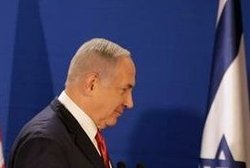 Israeli Prime Minister Benjamin Netanyahu is “the most extremist leader” in the history of the Quds-usurping regime, an American political analyst says, adding that under him Tel Aviv has sped up annexing Palestinian lands in order to expand settlement projects.
Israeli Prime Minister Benjamin Netanyahu is “the most extremist leader” in the history of the Quds-usurping regime, an American political analyst says, adding that under him Tel Aviv has sped up annexing Palestinian lands in order to expand settlement projects. RNA - Stephen Lendman, a political commentator from the US state of Massachusetts, made the remark in a phone interview with Press TV on Sunday, while commenting on a letter by a coalition of liberal American Jewish groups addressed to leaders of Israel’s political parties.
The letter, written by the Progressive Israel Network, warned the regime's party leaders against full or partial annexation of the occupied West Bank.
It asked Israeli politicians to oppose the annexation plan, pursued by Netanyahu, even if US President Donald Trump gives it a green light.
“Long-standing Israeli aims of Netanyahu and his predecessors have always been to annex all valued parts of the West Bank and East Jerusalem [al-Quds]… It wants all valued resources of the West Bank and if there are any in Gaza, it wants those. There are certainly valued resources off shore from Gaza and Israel wants those. The gas reserves that belong to Palestinian people but Israel wants them exploited for itself," Lendman told Press TV.
Netanyahu is "the most extremist Israeli leader" in the occupying entity’s history, with no interest in serving the interests of Palestinians who he’s been contemptuous of, Lendman added.
“The US one-sidedly supports Israel, ignores its high crimes, partners in its worst of aggression, supply billions of dollars every year… It amounts to something like 10 million dollars a day of US taxpayers’ money going into Israel and what is it for? It’s for persecuting Palestinians, it’s for homeland repression including against Jews if they rise up against the policies of the government,” the American analyst underlined.
Elsewhere in the interview, Lendman excoriated the way Israel swayed global perspective towards the Palestinian resistance movement, saying, "Anything that Palestinians do to defend themselves, Israel calls terrorism and the US media calls it the same thing, and whatever Israel does to exploit them and kill them; this is called self-defense.”
“The main thing of annexing land is the settlement project, but there are other ways that Israel is annexing land as well by isolating tourist sites that the Palestinians are excluded from, commercial areas for Jews only, roads for Jews only; things like this, closed military zones. This is the way of Israel annexing Palestinian land, West Bank land, East Jerusalem land and of course the separation wall, the apartheid wall that’s still is being built after a number of years... The plan that Israel really has is to exploit Palestinians and to miserate them so much that they just want to leave so Israel can take over their land,” Lendman went on to say.
The letter has been signed by up to 13 groups, including ten members of the Progressive Israel Network – an umbrella coalition that includes J Street and the New Israel Fund.
Earlier in mid-September, Netanyahu pledged to annex Jordan Valley, which makes up 30 percent of the West Bank area if he was re-elected.
More than 600,000 Israelis live in over 230 settlements built since the 1967 Israeli occupation of the Palestinian territories of the West Bank and East Jerusalem al-Quds.
The UN Security Council has condemned Israel’s settlement activities in the occupied territories in several resolutions.
Less than a month before Trump took office, the United Nations Security Council in December 2016 adopted Resolution 2334, calling on Israel to “immediately and completely cease all settlement activities in the occupied Palestinian territories, including East Jerusalem” al-Quds.
In December 2017, Trump's recognition of Jerusalem al-Quds as Israel's so-called capital touched off a wave of protests which continue to this day.
Palestinians want the West Bank as part of a future independent Palestinian state with East Jerusalem al-Quds as its capital.
The last round of Israeli-Palestinian talks collapsed in 2014. Among the major sticking points in those negotiations was Israel’s continued settlement expansion on Palestinian territories.
847/940